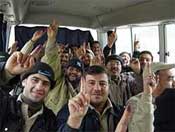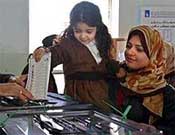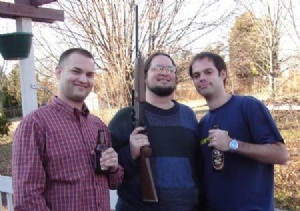
- 12/23/05 - Flight at 9:00am with a nice 3 hour layover in Washington Reagan airport, long enough to grab a pint (Old Dominion ale, quite nice) and a burger and people-watch as the other travelers rushed around. Got into Knoxville, TN around 3:30pm and met Jon. We took a side-trip to his workplace (Toyota) where he showed me his office and the gigantic warehouse where he coordinates the supply of car-parts from Japan and Vietnam to various manufacturers in the state. We hung out at his place for a bit and then hit the town, first the Downtown Grill & Brewery (so-so fajitas, decent beer, great wings) followed by Patrick Sullivan's (founded in 1888), where I proceeded to leave behind a very special (sentimental) Pop Will Eat Itself hat from their '94 tour and my semester in England. Argh!
- 12/24/05 Woke up and drove to Hickory, NC where we arrived concurrently with Renata and Nathan, fresh back from his Naval tour of the Middle East. In traditional Blosser fashion we presented beloved dad with a fifth of liquor, a six pack and some nice wine for the missus. We got a nice buzz on and spent some time male-bonding on the back porch, target-practice with Nathan's old BB gun.
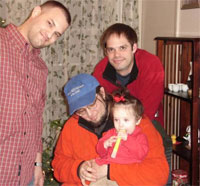 Amy's parents came over for dinner -- cheese fondu and a honey-baked ham courtesy of Jon's employers, with some delicious cake for dessert.
Amy's parents came over for dinner -- cheese fondu and a honey-baked ham courtesy of Jon's employers, with some delicious cake for dessert.Best of all, I got to see my baby sister Hannah Cabrini for the first time; she's a real cutie, and when she's not screaming she's got an impish grin on her face and a tendency to put anything and everything in her mouth.
After dinner we opened our Christmas presents -- a set of Iraq's "Most Wanted" Poker Cards from Pa; new fleece sweater from Amy's parents; a blue baseball cap embroidered with J.R.R. Tolkien's "Not All Who Wander Are Lost" from Amy (way cool).
We played several rounds of poker before/after dinner -- Jon taught me "Texas Hold 'Em" and Nathan a game called "Spit In The Ocean." I don't play all that often, but managed to win $20 in dimes and quarters over the course of the evening, with the loser doing mini-shots of Jim Beam. Unfortunately, Jon did most of the losing and passed out face-first on his old bunkbed in the garage (he slept on the bottom, myself on top) and we had to take off his shoes.
I had a fitful sleep, partly because I was on the top bunk and from Jon kicking me whenever I started snoring. We learned from Renata that ALL THREE of us were snoring away, poor girl.
- 12/25/05 . . . and then Pa started blaring Handel's Messiah at six o'clock in the morning. I don't recall this being a Christmas tradition, at least not at such an early hour. Amy's mom had prepared a delicious casserole of eggs, sausage and cheese -- I was tempted to get the recipe but I don't think soy sausage would suffice as an ingredient. We bundled up and went to Mass at St. Aloysius', Hickory where I was confirmed. Saw a lot of familiar faces. The choir was sparse due to the holidays but -- how shall we put this graciously? -- they tried very hard. Afterwards we went to lunch at Amy's parents, where "Grandpa" John showed us his (very impressive) collection of firearms (including World War II era), followed by more presents for Pa and Amy. Christmas evening was pretty low-key as we were all recovering from the night before; we saw The Big Lebowski (a personal favorite of Jon and I). Pa and I got into a minor dispute over the merits of The New Oxford Review, particularly editor Dale Vree's latest hatchet-piece on the neocons (Pa's a longtime fan, I'm really not). I went to bed in the guest room so as to spare Jon and Nathan my snoring.
- 12/26/05 -- Pa & Amy packed up and left early morning bound for Iowa to see Grandpa & Grandma Blosser. We went out to El Chapala Mexican restaurant (a tried-and-true source of authentic Mexican cuisine -- great margeritas, too) with Nathan and Renata, after which they left for home and Jon and I went shopping for supplies for our camping trip. We cleaned up the house and spent the evening at McGuire's Pub, another Blosser favorite and preferable to the rather pretentious Taproom. We talked politics, relationships and music and I did my best to persuade Jon on the merits of Elvis Presley, the Misfits and (classic) country & western. He'll
- 12/27/05 - After a brief stop at Outdoor Supply and the old Army-Navy store, Jon and I drove to the Wilson's Creek Wilderness Area, which is known for its many waterfalls. It was cold and the roads were a little icy. The main road leading to our trail was closed, so we were forced to pick an alternative route. We hiked in for .8 of a mile to a campground, where the trail veered off to the right and seemed to fade out -- nobody had been down there in a while, so we thrashed around in the brush a bit before finding out way onto another, longer trail and hiked along the creek a bit to a nice spot where we pitched camp and got a good, roaring fire going. Beef stew (canned) and beer (cheap six pack) for dinner; hot chocolate for dessert. The evening sky was cold, crisp and absolutely clear, making for perfect stargazing before bed. Jon brought a deck of cards and taught me Rummy.
- 12/28/05 Jon and I woke up around ten o'clock the next morning and after a breakfast of sausage and eggs broke camp and hiked out -- quite the workout for me, as New Yorker that I was, I hadn't been hiking (much less camping) in five years: going in was tough on the knees, coming out hell on the calves . . . all the more incentive to start exercising in the new year. We reached the end around noon, feasted on some fresh tangerines and made our way to Asheville, NC.
We showered and rested at Mom's apartment for a bit, spent an hour solving a five-star difficulty game of Sudoku that she had printed out for us, and then met her as she got off work at Earth Fare. Had a great Chipotle Chicken Burrito at Mamacita's Mexican Grill washed down with a good pint at Ed Boudreaux's BBQ. Walking around Asheville we ran into old and good friends Lisa Miller and Carrie, both of whom still reside in Hickory and had fled to Asheville for a change of scenery. (If you've ever lived in Hickory, you'll understand that fleeing to Asheville is a frequent and -- for the sake of preserving one's sanity -- necessary pasttime).
- 12/29/05 Spent the day in Asheville with my mom; breakfast, then laundry, a few used music and book stores, lunch of spicy Thai chicken curry and Basil Noodles at Doc Chey's and a pint of Chocolate Stout at Jack O' The Wood (where I picked up a t-shirt per wife's request).
- 12/30/05 Quick brunch of pulled pork, sweet fries and macaroni & cheese at Ed Boudreaux's BBQ (had to get in one last good BBQ meal while in the South); then off to Asheville airport for a 2:00pm flight to La Guardia, NYC.
All in all, an excellent vacation. (More photos from Pa here).
P.S. Jon swung by Sullivan's on the way back home and picked up my PWEI hat, so all is well and good in the land of Blosser.

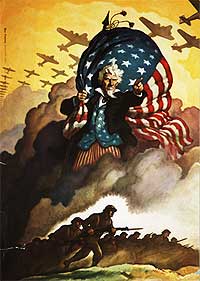
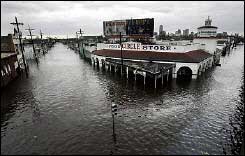


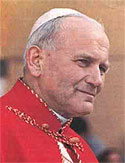 So, "Christ has opened the doors" to Karol Wojtyla, Pope John Paul II. Curiously, I find myself moved by the experience of watching the passing of our Holy Father, but not particularly saddened or distraught. He has run the good race, fought the good fight, lived a full life of great service to Christ and his Church -- and he himself seems content to go when the Lord calls him.
So, "Christ has opened the doors" to Karol Wojtyla, Pope John Paul II. Curiously, I find myself moved by the experience of watching the passing of our Holy Father, but not particularly saddened or distraught. He has run the good race, fought the good fight, lived a full life of great service to Christ and his Church -- and he himself seems content to go when the Lord calls him.


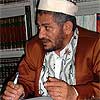
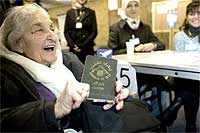
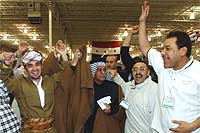
 Atheer Almudhafer, from Falls Church, Va., gives the Iraqi sign of victory after casting his absentee ballot at the New Carrollton, Md., voting station, Jan. 28, 2005. His finger is marked with indelible blue ink, intended to prevent double voting. "I give the sign of peace and voting. Together it is victory." [
Atheer Almudhafer, from Falls Church, Va., gives the Iraqi sign of victory after casting his absentee ballot at the New Carrollton, Md., voting station, Jan. 28, 2005. His finger is marked with indelible blue ink, intended to prevent double voting. "I give the sign of peace and voting. Together it is victory." [